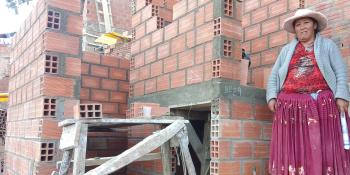
Two new projects launched in Bolivia and Indonesia
JTI Global WASH Fund: Helping thousands of people get access to clean and drinking water
Water, sanitation, and hygiene (abbreviation WASH) are central elements of the Sustainable Development 2030 Agenda. Available and sustainable management of water and sanitation for all is ensured by the Sustainable Development Goal 6. On top of that, access to water and sanitation facilities are vital components of adequate housing, as affirmed by Habitat for Humanity’s housing quality standards and the right to adequate housing in the Universal Declaration of Human Rights.
Having the experience with JTI Global WASH Fund helping thousands of people get access to clean and safe water in the last four years in Bangladesh, Ethiopia, Mexico, Habitat for Humanity International has launched two new three-year WASH projects in Bolivia and Indonesia.
---------------------------------------------------
Bolivia – Yaku: Water and Sanitation in Peri-urban Neighborhoods of Bolivia
Bolivia’s 2009 Political Constitution of the State establishes access to water and sanitation as a basic human right. Various sectoral policies have been adopted to improve access to water and sanitation across the country. However, despite the efforts of the State, the Bolivian population continues to face key challenges in terms of accessing quality water and sanitation.
In the metropolitan area of La Paz, with over 1,9 million inhabitants, over 50% of the population lacks access to basic services (bathroom facilities, drainage systems and wastewater treatment) and over 57% lack access to water. The situation is critical also in the Cochabamba metropolitan area with 1,5 million inhabitants, where over 72% of the population consumes unsafe water.
The lack of access to water and sanitation has reverberating effects on health, productivity, and education, particularly for women and girls, who often spend several hours a day collecting, storing, and managing household water.
For this reason, this new project supported by JTI Global WASH Fund is focused on providing solutions that increase the coverage, quality, and efficiency of WASH investments in vulnerable peri-urban neighborhoods. This will be achieved through the promotion of community-level management capacity, municipal participation in project management and investment, and the provision of water conservation solutions. In order to improve access to water and sanitation there will be new rainwater collection systems together with individual bathrooms and hand washing stations installed. Water purification and sanitation systems will be installed or upgraded in households, schools, community centers and health centers, too.
The program aims to serve 76,570 people through empowerment, training and community awareness as well as household, community and market-based water, sanitation and hygiene solutions. The program will be implemented in Bolivia over three years, starting in 2023 and running through 2025.
---------------------------------------------------
Indonesia – Increasing Local Community Resilience in WASH Sector in Districts of Bogor, Tangerang and Gresik
Indonesia is a country rich in water resources, where water availability exceeds demands in almost all locations. However, seasonal variability creates water stress in the dry season. As such, water stress is the result of a lack of or malfunctioning infrastructure rather than an absolute lack of water.
Sanitation and hygiene are another major WASH problem. Open defecation poses huge risks to community health, in particular for children, as this can contaminate the water supply and facilitate the spread of diarrheal diseases such as cholera, leading to stunting, wasting and environmental enteropathy.
The project’s overall objective is to increase the quality of life of low-income families in Indonesia’s districts of Tangerang, Bogor, and Gresik. This will be achieved by enhancing access to safe and decent housing and community infrastructure, as well as capacity and awareness in WASH through four key activities such as household-level construction, community-level construction, capacity building, and awareness raising.
People from these three districts will benefit from newly constructed household toilets, improved water sources and renovated integrated health facilities for mothers and young children. Locals will be also reached by WASH awareness campaigns and trainings in hygiene awareness and healthy house management.
The project aims to benefit a total of 207,122 unique individuals. The program will be implemented in Indonesia over three years, starting in 2023 and running through 2025.